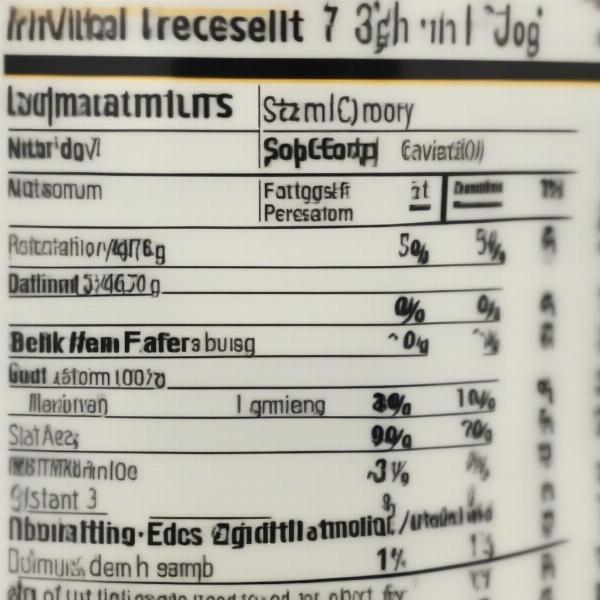Johnsonville hot dogs are a popular barbecue staple, but can dogs enjoy them too? While the occasional small bite of a plain Johnsonville hot dog might not cause immediate harm, they aren’t recommended as a regular treat for your furry friend. Understanding the ingredients and potential risks associated with feeding processed meats like hot dogs is crucial for responsible dog ownership. Let’s delve into the details and explore healthier alternatives to keep your dog happy and healthy.
While the aroma of grilling Johnsonville hot dogs might tempt your dog, their high sodium and fat content, along with potentially harmful additives like nitrates and preservatives, pose several health risks. Regularly feeding your dog Johnsonville hot dogs can contribute to obesity, pancreatitis, and even sodium poisoning. Furthermore, some dogs may be allergic to certain ingredients, leading to digestive upset or skin issues.
Can Dogs Eat Johnsonville Hot Dogs? A Closer Look at the Ingredients
A key reason why Johnsonville hot dogs aren’t ideal for dogs lies in their ingredient list. They are typically high in sodium, which can cause excessive thirst, dehydration, and even sodium ion toxicosis in severe cases. The high fat content can also contribute to pancreatitis, a painful and potentially life-threatening inflammation of the pancreas.
 Johnsonville Hot Dog Ingredients List
Johnsonville Hot Dog Ingredients List
Many commercial hot dogs, including Johnsonville, contain nitrates and nitrites, which are used as preservatives but can also be converted into cancer-causing compounds in the body. While the risk from occasional consumption is low, regular exposure can be detrimental to your dog’s long-term health.
Healthy Alternatives to Johnsonville Hot Dogs for Dogs
Instead of offering Johnsonville hot dogs, consider healthier alternatives that are specifically formulated for canine consumption. Dog treats made with natural ingredients, such as lean meats, fruits, and vegetables, provide essential nutrients without the harmful additives found in processed meats.
You can also offer small pieces of cooked, unseasoned chicken, turkey, or beef as a healthy and delicious treat. Always ensure the meat is cooked thoroughly and remove any bones or skin before giving it to your dog.
What to Do If Your Dog Eats a Johnsonville Hot Dog
If your dog accidentally snatches a bite of a Johnsonville hot dog, don’t panic. A small amount is unlikely to cause serious harm. Monitor your dog for any signs of digestive upset, such as vomiting or diarrhea. If your dog consumes a large quantity or exhibits any concerning symptoms, contact your veterinarian immediately.
Can Dogs Eat Other Types of Hot Dogs?
While Johnsonville hot dogs aren’t recommended, the same holds true for most commercially available hot dogs. The high sodium, fat, and additive content make them a less-than-ideal choice for your canine companion. Always prioritize your dog’s health by offering nutritious treats and a balanced diet.
Conclusion
While the occasional small bite of a plain Johnsonville hot dog might not cause immediate harm, it’s best to avoid them altogether. Choose healthier alternatives, such as dog-specific treats or small pieces of cooked, unseasoned meat, to keep your furry friend happy and healthy. Remember, a balanced diet and appropriate treats are crucial for your dog’s overall well-being.
FAQ
- Can a small piece of Johnsonville hot dog kill my dog? A small piece is unlikely to be fatal, but large quantities can lead to health problems.
- What are the signs of sodium poisoning in dogs? Excessive thirst, vomiting, diarrhea, tremors, and seizures are potential signs.
- What are some healthy treat alternatives to hot dogs? Cooked, unseasoned meat, fruits, vegetables, and commercially available dog treats made with natural ingredients are good options.
- What should I do if my dog eats a whole Johnsonville hot dog? Contact your veterinarian immediately.
- Are there any types of hot dogs that are safe for dogs? While some “dog-friendly” hot dogs exist, it’s best to offer healthier alternatives like those mentioned above.
- Can I give my dog a Johnsonville hot dog if I remove the casing? Even without the casing, the high sodium and fat content still pose risks.
- Are Johnsonville hot dogs worse for dogs than other brands? Most commercial hot dogs share similar risks due to their ingredients.
ILM Dog is your trusted international resource for all things canine. We offer expert advice on dog breeds, health, training, nutrition, grooming, activities, and much more. Whether you’re a new dog owner or a seasoned expert, our articles provide valuable insights and practical tips to enhance your dog’s well-being. For expert advice tailored to your dog’s needs, contact us at [email protected] or call us at +44 20-3965-8624. ILM Dog is dedicated to providing accurate and up-to-date information to help you make informed decisions about your dog’s care.